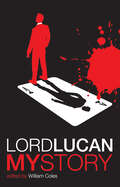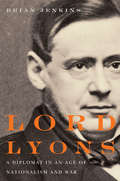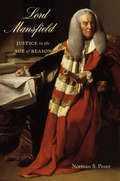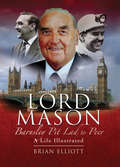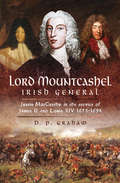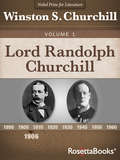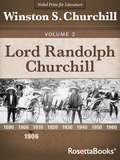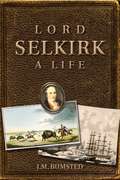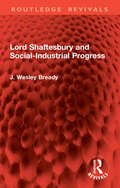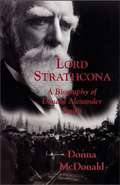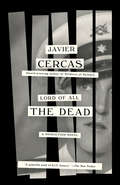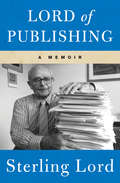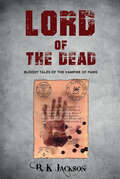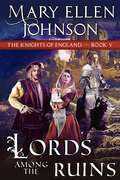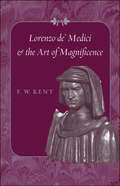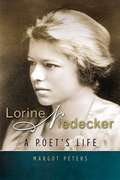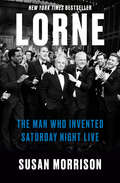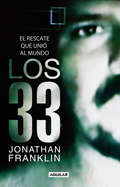- Table View
- List View
Lord Lucan: My Story
by William ColesThe British Lord who became a legendary fugitive tells his story of murder and escape in this fictionalized account of the infamous scandal.On November 7th, 1974, a murder plot goes disastrously wrong. John Bingham, 7th Earl of Lucan, had intended to do away with his wife. Instead, it is their nanny, Sandra Rivett, who lies dead in the basement of their London home. The following day, Lord Lucan disappeared. And despite a global hunt, he was never seen again.Bingham had once been the most charismatic members of the British peerage. A frequent gambler, he was known as Lucky Lord Lucan—even though his losses often exceeded his winnings. Since his disappearance, he has become a legend of a very different sort. Here, in his own hand, is Lord Lucan&’s confession to his grizzly crimes, and the story of his mysterious life. It is a strange tale of an Old Etonian Earl on the run; of how a man became a murderer; and how a life-long friendship soured into an enduring hate. Here, for the first time, is the full monstrous account of the life of Lord Lucan.
Lord Lyons
by Brian JenkinsThe British ambassador in Washington during the US Civil War and ambassador in Paris before and after the Franco-Prussian war, Lord Lyons (1817-1887) was one of the most important diplomats of the Victorian period. Although frequently featured in histories of the United States and Europe in the second half of the nineteenth century, and in discussions and analyses of British foreign policy, he has remained an ill-defined figure. In Lord Lyons: A Diplomat in an Age of Nationalism and War, Brian Jenkins explains the man and examines his career. Based on a staggering study of primary sources, he presents a convincing portrait of a subject who rarely revealed himself personally. Though he avoided publicity, Lyons came to be regarded as his nation's premier diplomat as his career took him to the heart of the great international issues and crises of his generation. As minister to the United States he played a vital role in preserving Anglo-American peace and was a powerful voice opposing Anglo-French intervention in the Civil War. While ambassador to the Ottoman Empire, he helped to prevent French control of the Suez Canal then under construction. In France, he maintained an amiable and constructive relationship with a bitter nation struggling to reorganize itself and its constitution after the Franco-Prussian War. For many historians Lord Lyons has been difficult to ignore but hard to admire. In rescuing him as a truly important historical figure, Jenkins details for the first time the personal and public strategies Lyons employed through decades of exemplary diplomatic service on both sides of the Atlantic.
Lord Lyons: A Diplomat in an Age of Nationalism and War
by Brian JenkinsThe British ambassador in Washington during the US Civil War and ambassador in Paris before and after the Franco-Prussian war, Lord Lyons (1817-1887) was one of the most important diplomats of the Victorian period. Although frequently featured in histories of the United States and Europe in the second half of the nineteenth century, and in discussions and analyses of British foreign policy, he has remained an ill-defined figure. In Lord Lyons: A Diplomat in an Age of Nationalism and War, Brian Jenkins explains the man and examines his career. Based on a staggering study of primary sources, he presents a convincing portrait of a subject who rarely revealed himself personally. Though he avoided publicity, Lyons came to be regarded as his nation's premier diplomat as his career took him to the heart of the great international issues and crises of his generation. As minister to the United States he played a vital role in preserving Anglo-American peace and was a powerful voice opposing Anglo-French intervention in the Civil War. While ambassador to the Ottoman Empire, he helped to prevent French control of the Suez Canal then under construction. In France, he maintained an amiable and constructive relationship with a bitter nation struggling to reorganize itself and its constitution after the Franco-Prussian War. For many historians Lord Lyons has been difficult to ignore but hard to admire. In rescuing him as a truly important historical figure, Jenkins details for the first time the personal and public strategies Lyons employed through decades of exemplary diplomatic service on both sides of the Atlantic.
Lord Mansfield
by Norman PoserIn the first modern biography of Lord Mansfield (1705-1793), Norman Poser details the turbulent political life of eighteenth-century Britain's most powerful judge, serving as chief justice for an unprecedented thirty-two years. His legal decisions launched England on the path to abolishing slavery and the slave trade, modernized commercial law in ways that helped establish Britain as the world's leading industrial and trading nation, and his vigorous opposition to the American colonists stoked Revolutionary fires. Although his father and brother were Jacobite rebels loyal to the deposed King James II, Mansfield was able to rise through English society to become a member of its ruling aristocracy and a confidential advisor to two kings. Poser sets Mansfield's rulings in historical context while delving into Mansfield's circle, which included poets (Alexander Pope described him as "his country's pride"), artists, actors, clergymen, noblemen and women, and politicians. Still celebrated for his application of common sense and moral values to the formal and complicated English common law system, Mansfield brought a practical and humanistic approach to the law. His decisions continue to influence the legal systems of Canada, Britain, and the United States to an extent unmatched by any judge of the past. An illuminating account of one of the greatest legal minds, Lord Mansfield presents a vibrant look at Britain's Age of Reason through one of its central figures.
Lord Mansfield: Justice in the Age of Reason
by Norman S. PoserIn the first modern biography of Lord Mansfield (1705-1793), Norman Poser details the turbulent political life of eighteenth-century Britain's most powerful judge, serving as chief justice for an unprecedented thirty-two years. His legal decisions launched England on the path to abolishing slavery and the slave trade, modernized commercial law in ways that helped establish Britain as the world's leading industrial and trading nation, and his vigorous opposition to the American colonists stoked Revolutionary fires. Although his father and brother were Jacobite rebels loyal to the deposed King James II, Mansfield was able to rise through English society to become a member of its ruling aristocracy and a confidential advisor to two kings. Poser sets Mansfield's rulings in historical context while delving into Mansfield's circle, which included poets (Alexander Pope described him as "his country's pride"), artists, actors, clergymen, noblemen and women, and politicians. Still celebrated for his application of common sense and moral values to the formal and complicated English common law system, Mansfield brought a practical and humanistic approach to the law. His decisions continue to influence the legal systems of Canada, Britain, and the United States to an extent unmatched by any judge of the past. An illuminating account of one of the greatest legal minds, Lord Mansfield presents a vibrant look at Britain's Age of Reason through one of its central figures.
Lord Mason, Barnsley Pitlad to Peer: A Life Illustrated
by Brian ElliottRoy Mason swapped the colliery for Westminster when elected MP for Barnsley in 1953. He went on to become one of the leading figures in the Labour Party during the 1960s and 1970s, holding a number of prestigious offices including Defence Secretary from 1974 and Secretary of State for Northern Ireland from 1976. This photographic biography presents images from Mason's own archive charting his personal and political life from the Yorkshire pits to the House of Lords.
Lord Mountcashel: Justin MacCarthy in the Service of James II and Louis XIV, 1673–1694
by D. P. GrahamJustin MacCarthy (later Lord Mountcashel) was born into a notable family of Irish Jacobites, loyal to the exiled Stuarts, and grew up in France. Their Irish land was regained after the Restoration of Charles II but Justin, as the youngest surviving son, sought a career in the French army (as both his father and oldest brother had done). In 1673 he joined an Irish regiment in French service. He served under the legendary French marshals Turenne and Conde against the Dutch and their Imperial allies and by 1676 was commanding the regiment. He became part of the personal circle of the Catholic Duke of York, the future James II and, after the latters accession in 1685, Justin helped to transform the Irish army into a Catholic one.When James II was deposed in the Glorious Revolution of 1688 and fled via France to Ireland, Justin was one of the most experienced commanders resisting Williams invasion. Unfortunately MacCarthy was defeated at the Battle of Newtownbutler (1689), wounded and captured. He escaped and again went into exile in France, where he was the first commander of the famous Irish Brigade until his death in 1694.
Lord Randolph Churchill Volume 1 (Lord Randolph Churchill #1)
by Winston S. ChurchillThe first volume of the Nobel Prize-winning Prime Minister&’s biography of his father, the fiery Conservative Party leader of late Victorian Britain. In 1906, Sir Winston Churchill produced a two-volume biography of his father Lord Randolph Churchill, the 19th century Member of Parliament whose political career ended in scandal. This first volume deals with early events in Randolph&’s life, including his upbringing, his education, and his election to the House of Commons as the Conservative MP for Woodstock. This volume also recount&’s Randolph&’s quarrel with the Prince of Wales in a daring gambit to protect the integrity of the Churchill family name. This episode resulted in Churchill&’s temporary exile from British high society, a prequel to his later disgrace. While Winston Churchill is clearly a supporter of his father&’s, he is not afraid to be honest about the mistakes and failures of his career and personal life.
Lord Randolph Churchill Volume 2 (Lord Randolph Churchill #2)
by Winston S. ChurchillThe second volume of the Nobel Prize-winning Prime Minister&’s biography of his father, the controversial Victorian era British MP. In 1906, Sir Winston Churchill produced a two-volume biography of his father Lord Randolph Churchill, the 19th century Member of Parliament whose political career ended in scandal. This second volume detail&’s the elder Churchill&’s emergence as an independent leader who challenged the old guard of his own Conservative Party. As an obscure and overlooked backbench MP, Randolph established a cohort of Tory rebels known as the &“fourth party.&” Though excluded from British high society, he nevertheless made a name for himself and rose to become Chancellor of the Exchequer. But as he was on course to run for Prime Minister, his confrontational style led to a career-ending blunder.
Lord Selkirk: A Life
by J.M. BumstedThomas Douglas, the Fifth Earl of Selkirk (1770–1820), was a complex man of his times, whose passions left an indelible mark on Canadian history. A product of the Scottish Enlightenment and witness to the French Revolution, he dedicated his fortune and energy to the vision of a new colony at the centre of North America. His final legacy, the Red River Settlement, led to the eventual end of the dominance of the fur trade and began the demographic and social transformation of western Canada. The product of three decades of research, this is the definitive biography of Lord Selkirk. Bumsted’s passionate prose and thoughtful analysis illuminate not only the man, but also the political and economic realities of the British empire at the turn of the nineteenth century. He analyzes Selkirk’s position within these realities, showing how his paternalistic attitudes informed his “social experiments” in colonization and translated into unpredictable, and often tragic, outcomes. Bumsted also provides extensive detail on the complexities of colonization, the Scottish Enlightenment, Scottish peerage, the fur trade, the Red River settlement, and early British-Canadian politics.
Lord Shaftesbury and Social-Industrial Progress (Routledge Revivals)
by J. Wesley BreadyOriginally published in 1926, this volume is much more than a biography of an outstanding politician, social reformer and philosopher. It provides an analysis of the history of social conditions in England during the nineteenth century, as well as a discussion of the development of social affairs and the inertia of political psychology. The role that faith and religion played in motivating Lord Shaftesbury’s desire for social reform is also discussed as is the ways in which he and John Wesley transformed the social and ethical ideas of England to enshrine in law many of the working conditions that we take for granted today such as defined hours of work and rest periods.
Lord Strathcona: A Biography of Donald Alexander Smith
by Donna McdonaldDonald Smith, known to most Canadians as Lord Strathcona, was an adventurer who made his fortune building railroads. He joined the Hudson’s Bay Company at age eighteen and went on to build the first railway to open the Canadian Northwest to settlement. As his crowning achievement, he drove the last spike for the nation-building Canadian Pacific Railway. In 1896, Smith became Canada’s High Commissioner in London and was soon elevated to the peerage. He became a generous benefactor to Canadian institutions. This eminently readable biography brings to light new information, including details about Strathcona’s personal life and his scandalous marriage.
Lord of All the Dead: A nonfiction novel
by Javier CercasFrom the internationally renowned author of The Impostor, a courageous journey into his own family history and that of a country collapsing from a fratricidal war--his most moving, most personal book, one he has spent his entire life preparing to write.Javier Cercas grew up hearing the legend of his adored great-uncle Manuel Mena, who died at nineteen in the bloodiest battle of the Spanish Civil War--while fighting for Franco's army. Who was this young man? A fascist hero whose memory is an embarrassment or a committed idealist who happened to fall on the wrong side of history? Is it possible to be a moral person defending an immoral cause? Through visits back to his parents' village in southern Spain, interviews with survivors, and research into the murkiest corners of the war, the author pieces together the life of this enigmatic figure and of an entire generation. This sui generis work combines intimate family history, investigative scholarship, personal confession, war stories, and road trips, finally becoming a transcendent portrait of a country's indelible scars--a book about heroism, death, the persistence of the past, and the meaning of an individual life against the tapestry of history.
Lord of Publishing: A Memoir
by Sterling LordA frank and insightful memoir of a life spent in publishing, by one of literature&’s most legendary agentsSterling Lord has led an extraordinary life, from his youth in small-town Iowa to his post-war founding and editing of an English-language magazine in Paris, followed by his move to New York City to become one of the most powerful literary agents in the field. As agent to Jack Kerouac, Ken Kesey, and countless others—ranging from Jimmy Breslin and Rocky Graziano to the Berenstains and four US cabinet members—Lord is the decisive influence and authors&’ confidant who has engineered some of the most important book deals in literary history. In Lord of Publishing, his memoir of life and work (and tennis), Lord reveals that he is also a consummate storyteller. Witty and wise, he brings to life what was arguably the greatest era of book publishing, and gives a brilliant insider&’s scoop on the key figures of the book business—as well as some of the most remarkable books and authors of our time.
Lord of the Dead: Bloody Tales of the Vampire of Paris
by B K JacksonIn an age where the story of murder is told of perpetrators who are generally behind bars, by the families of the victims of crime, or by the authorities who have prosecuted killers, here is a story told from a different perspective. This is the story of Nicolas Claux, a self-confessed Vampire and Cannibal who, having been convicted of murder in the 1990’s in France, and has since been subsequently released from prison. This is the story of his life, from his own words and detailed recollections, told in a manner unlike any other. This is an insight into the life and mind of a killer.
Lord, I Want to Be Whole
by Stormie O'MartianBriefly describes the author's difficult childhood and the choices that led her into a destructive lifestyle that eventually left her empty and alone, then presents seven steps for living the Christian life in obedience to God. Includes a discussion of how to release the past, confess sins before God, seek deliverance from past bondage, and stand strong in freedom from pain. Offers ways to seek emotional, physical, and spiritual wholeness following abuse or trauma.
Lords Among the Ruins: A Medieval Romance (The Knights of England Series #5)
by Mary Ellen JohnsonAs the Fourteenth-Century Closes, So Does the Rule of England's Most Tyrannical Monarch in the Medieval Historical, LORDS AMONG THE RUINS, by Mary Ellen JohnsonMedieval England from the Aftermath of 1381 Peasants’ Revolt to the Deposition and Murder of Richard II on 14 Feb 1400As the former boy king, Richard II, approaches his third decade, Matthew Hart and England’s other great lords struggle to deflect his more destructive impulses, which increasingly threaten the kingdom.Amidst attempted assassinations, growing civil war and political intrigue, Matthew Hart, his beloved wife, Margery Watson, and their offspring live and love and war their way through the last years of the fourteenth century, seeing the deposition and murder of England’s most tyrannical monarch.Publisher's Note: Readers with a passion for history will appreciate the author's penchant for detail and accuracy. In keeping with the era, this story contains scenes of brutality which are true to the time and man's timeless inhumanity. There are a limited number of sexual scenes and NO use of modern vulgarity.From the Author: There is nothing new under the sun. If we seek to understand today’s events, history will always provide the answer. By 1398 the megalomaniacal Richard II had consolidated his power, executed or banished all his enemies and destroyed all those who might speak out in opposition to him. Two years later Richard was deposed, thrown into a dungeon in Pontefract Castle and starved to death. Lessons: We can never predict the future; actions always have unintended consequences; we sow the seeds of our own destruction and payback’s a bitch!THE KNIGHTS OF ENGLAND, in series orderThe Lion and the LeopardA Knight There WasWithin A Forest DarkA Child Upon The ThroneLords Among the Ruins
Lorenzo de' Medici and the Art of Magnificence (The Johns Hopkins Symposia in Comparative History #24)
by F. W. KentIn the past half century scholars have downplayed the significance of Lorenzo de' Medici (1449–1492), called "the Magnificent," as a patron of the arts. Less wealthy than his grandfather Cosimo, the argument goes, Lorenzo was far more interested in collecting ancient objects of art than in commissioning contemporary art or architecture. His earlier reputation as a patron was said to be largely a construct of humanist exaggeration and partisan deference.Although some recent studies have taken issue with this view, no synthesis of Lorenzo as art patron and art lover has yet emerged. In Lorenzo de' Medici and the Art of Magnificence historian F. W. Kent offers a new look at Lorenzo's relationship to the arts, aesthetics, collecting, and building—especially in the context of his role as the political boss (maestro della bottega) of republican Florence and a leading player in Renaissance Italian diplomacy. As a result of this approach, which pays careful attention to the events of his short but dramatic life, a radically new chronology of Lorenzo's activities as an art patron emerges, revealing them to have been more extensive and creative than previously thought. Kent's Lorenzo was broadly interested in the arts and supported efforts to beautify Florence and the many Medici lands and palaces. His expertise was well regarded by guildsmen and artists, who often turned to him for advice as well as for patronage. Lorenzo himself was educated in the arts by such men, and Kent explores his aesthetic education and taste, taking into account what is known of Lorenzo's patronage of music and manuscripts, and of his own creative work as a major Quattrocento poet. Richly illustrated with photographs of Medici landmarks by Ralph Lieberman, Lorenzo de' Medici and the Art of Magnificence offers a masterful portrait of Lorenzo as a man whose achievements might have rivaled his grandfather's had he not died so young.
Loretta Lynn: Coal Miner's Daughter
by Loretta Lynn George VecseyHere is the story of a resourceful woman whose talent has taken her a far piece from being nervous and pregnant and poor - a bride at thirteen, a mother of four by eighteen - in Butcher Holler, Kentucky, to reigning as America's undisputed queen of country music. Though still a coal miner's daughter at heart, Loretta Lynn is Big Time: the Country Music Association has feted her with more- honors than any other recording artist; she's the first woman ever named Entertainer of the Year and the first woman in country music to win a gold record.
Lorine Niedecker
by Margot PetersLorine Niedecker (1903–70) was a poet of extraordinary talent whose life and work were long enveloped in obscurity. After her death in 1970, poet Basil Bunting wrote that she was “the most interesting woman poet America has yet produced . . . only beginning to be appreciated when she died.” Her poverty and arduous family life, the isolated home in Wisconsin that provided rich imagery for her work, and her unusual acquaintances have all contributed to Niedecker’s enigmatic reputation. Margot Peters brings Lorine Niedecker’s life out of the shadows in this first full biography of the poet. She depicts Niedecker’s watery world on Blackhawk Island (near Fort Atkinson, Wisconsin), where she was born and spent most of her life. A brief college career cut short by family obligations and an equally brief marriage were followed in 1931 by the start of a life-changing correspondence and complicated thirty-five-year friendship with modernist poet Louis Zukofsky, who connected Niedecker to a literary lifeline of distant poets and magazines. Supporting herself by turns as a hospital scrubwoman and proofreader for a dairy journal, Niedecker made a late marriage to an industrial painter, which gave her time to write and publish her work in the final decades of her life. During her lifetime, Niedecker’s poetry was praised by a relatively small literary circle, including Zukofsky, William Carlos Williams, Robert Creeley, Denise Levetov, and Allen Ginsberg. Since her death much more of her surviving writings have been published, including a comprehensive edition of collected works and two volumes of correspondence. Through Margot Peters’s compelling biography, readers will discover Lorine Niedecker as a poet of spare and brilliant verse and a woman whose talent and grit carried her through periods of desperation and despair.
Lornah Kiplagat: Long-Distance Hero (Fountas & Pinnell LLI Gold #Level R)
by Gary MillerLornah Kiplagat: Long-Distance Hero Author: Gary Miller
Lorne: The Man Who Invented Saturday Night Live
by Susan MorrisonNEW YORK TIMES BESTSELLER • The definitive biography of Lorne Michaels, the man behind America&’s most beloved comedy show&“The kind of biographical monument usually consecrated to founding fathers, canonical authors and world-historical scientific geniuses.&”—The New York Times (Editors&’ Choice)&“Readers are treated to the Holy Grail for any journalist hoping to crack the show: a warts-and-all week in the life of SNL, where Morrison gets to see the real process of putting the thing together.&”—VarietyOver the fifty years that Lorne Michaels has been at the helm of Saturday Night Live, he has become a revered and inimitable presence in the entertainment world. He&’s a tastemaker, a mogul, a withholding father figure, a genius spotter of talent, a shrewd businessman, a name-dropper, a raconteur, the inspiration for Dr. Evil, the winner of more than a hundred Emmys—and, essentially, a mystery. Generations of writers and performers have spent their lives trying to figure him out, by turns demonizing and lionizing him. He&’s &“Obi-Wan Kenobi&” (Tracy Morgan), the &“great and powerful Oz&” (Kate McKinnon), &“some kind of very distant, strange comedy god&” (Bob Odenkirk).Lorne will introduce you to him, in full, for the first time. With unprecedented access to Michaels and the entire SNL apparatus, Susan Morrison takes readers behind the curtain for the lively, up-and-down, definitive story of how Michaels created and maintained the institution that changed comedy forever.Drawn from hundreds of interviews—with Michaels, his friends, and SNL&’s iconic stars and writers, from Will Ferrell to Tina Fey to John Mulaney to Chris Rock to Dan Aykroyd—Lorne is a deeply reported, wildly entertaining account of a man singularly obsessed with the show that would define his life and have a profound impact on American culture.
Lorraine
by Lorraine KellyNational treasure Lorraine Kelly has been great company for years: a sunny, vivacious and loveable presence in your home. Now it's possible to get to know her even better as, for the first time, she opens up about her eventful life and tells her story in her own words. From her working-class childhood growing up in one of the toughest areas of Glasgow, to her early career in journalism during which she covered heartbreaking tragedies such as Dunblane and Lockerbie, and her gradual emergence as the undisputed Queen of Morning TV, Lorraine reveals a life like no other with characteristic warmth and charm. Entertaining, funny and a little bit mischievous, her anecdotes are garnered from a lifetime of meeting, greeting and interrogating the famous and infamous. Full of gossip, glamour and Lorraines inimitable good sense, LORRAINE: BETWEEN YOU AND ME is a book to settle on the sofa with.
Lorraine
by Lorraine KellyNational treasure Lorraine Kelly has been great company for years: a sunny, vivacious and loveable presence in your home. Now it's possible to get to know her even better as, for the first time, she opens up about her eventful life and tells her story in her own words. From her working-class childhood growing up in one of the toughest areas of Glasgow, to her early career in journalism during which she covered heartbreaking tragedies such as Dunblane and Lockerbie, and her gradual emergence as the undisputed Queen of Morning TV, Lorraine reveals a life like no other with characteristic warmth and charm. Entertaining, funny and a little bit mischievous, her anecdotes are garnered from a lifetime of meeting, greeting and interrogating the famous and infamous. Full of gossip, glamour and Lorraines inimitable good sense, LORRAINE: BETWEEN YOU AND ME is a book to settle on the sofa with.
Los 33: El rescate que unió al mundo
by Franklin, JonathanLos 33 es más que una gran crónica, es un libro escrito de manera vibrante y comprometida, que trasciende la mera anécdota y nos descubre a los seres humanos que hay detrás de las grandes epopeyas. Una serie de casualidades, los caprichos del destino y algunas decisiones de última hora hicieron que 33 hombres entrasen en la minade San José (Chile) el 5 de agosto de 2010. Ni ellos ni sus familias imaginaron los acontecimientos que se sucederían más tarde.La historia de los 33 es un testimonio de fuerza y de supervivencia en condiciones extremas que pone de relieve la lucha desesperada de un grupo de hombres contra la humedad, el calor, el hambre, el fantasma del canibalismo, la oscuridad, las alucinaciones. De cómo se desarrollaron cada uno de los 70 días que estuvieron sepultados bajo tierra -el sentimiento de comunidad y unión, Jesucristo como el minero 34, el papel del líder, la asignación de tareas, el racionamiento delos recursos, la fe- o de cómo actuó el Gobierno de Chile para organizar el rescate, de la resistencia de las familias y del poder de esta historia seguida por cientos de ojos a nivel mundial da cuenta este libro. El periodista Jonathan Franklin, corresponsal en Chile para los periódicos The Guardian, The Washington Post y The Sydney Morning Herald, obtuvo el permiso de las autoridades para contar de primera mano todo lo que estaba sucediendo dentro y fuera de la mina. Los 33 nos acerca la realidad de un fenómeno sociológico que aunó los corazones de la ciudadanía global y que supuso un desafío tecnológico como no se recordaba desde que el hombre pisó la Luna. Una obra necesaria para conocer el trasfondo de los acontecimientos vividos del que sin duda fue el rescate que unió al mundo.
